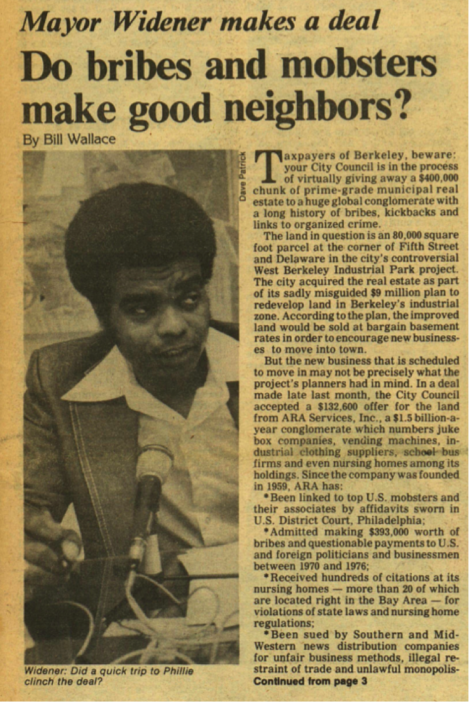With this article printed in the Berkeley Barb, reporter Bill Wallace sealed the fate of the West Berkeley Industrial Park, which he called “sadly misguided.” Wallace enumerated the many accusations against ARA Services Inc., to which Mayor Warren Widener had arranged the sale of the Park. Philadelphia-based ARA was linked to organized crime and admitted to bribing politicians. ARA’s Bay Area subsidiaries were just as disreputable, including multiple criminally negligent nursing homes. Once the story broke, public outcry stopped the deal in its tracks and a new City Council elected three months later cancelled the plan for industrial expansion in West Berkeley altogether.
Warren Widener, a graduate of Berkeley Law, was elected mayor of Berkeley in 1971, two years after his election to the City Council. Inheriting the West Berkeley Industrial Park plan from his predecessor, Republican Wallace Johnson, Widener was a staunch opponent of the Neighborhood Preservation Ordinance. He had tried to send out a last minute “clarifying notice” to voters, but could not get enough council votes. After the NPO passed, Mayor Widener realized the WBIP was completely stalled and turning into a massive boondoggle. Seeking to wash his hands of the project, he arranged to sell the unimproved land for $132,600, just under a third of its estimated value. He visited Philadelphia to seal the deal with ARA Services Inc., a conglomerate which planned to build an industrial laundry facility.
Bill Wallace, a Vietnam Veteran, attended Cal on the GI Bill and graduated in 1973, going on to write for the Daily Californian, SF Bay Guardian, and Berkeley Barb. The Barb was a weekly alternative newspaper, often sold by hippies on Telegraph Avenue. Founded in the mid-1960s, it was reaching the end of its run by the time this article was published in 1979, going out of print the following year. As an investigative reporter, Wallace was fearless in challenging authority. After the Berkeley Barb went under, he worked at the San Francisco Chronicle for over 20 years.
In this article, Wallace took on not only the mayor of Berkeley but the Detroit Mafia as well. Wallace detailed an FBI investigation that revealed ARA Vending, an ARA subsidiary, had allowed $50,000 dollars to be skimmed by Anthony “Tony Jack” Giacalone, a capo in the “Detroit Partnership” crime family and a “central figure in the disappearance of Teamster boss Jimmy Hoffa.” The article’s photos, by Dave Patrick, featured inflammatory questions as captions. “Widener: Did a quick trip to Phillie clinch the deal?” and “Pulling down homes for the mob: Do corrupt multi-nationals make good neighbors?” While Wallace did not go so far as to overtly accuse Berkeley’s mayor of corruption, the focus on “ARA’s history of bribery and kickbacks” and Widener’s trip to Philadelphia makes the implication clear. As Wallace put it, “the evidence suggests that ARA may not be a very good neighbor, and raises serious questions about the probity [ie. integrity] of public officials who would bend over backwards to welcome them to town.” The exposé stirred up public outrage, causing Mayor Widener to cancel the deal and possibly contributing to his loss in the 1979 race for reelection. ARA Services, Inc. became Aramark, today a Fortune 500 company centered around food services.
